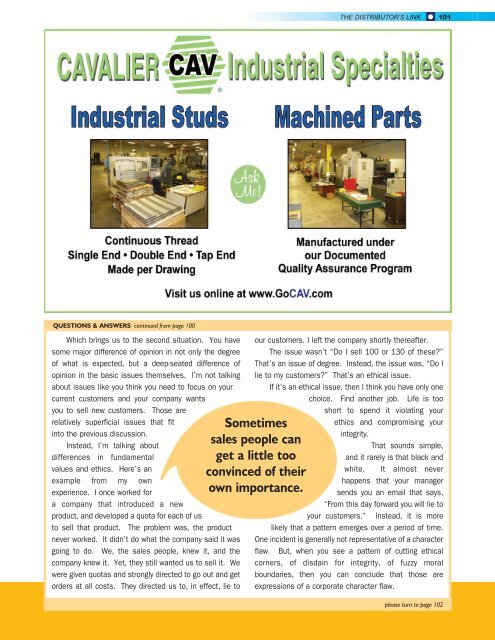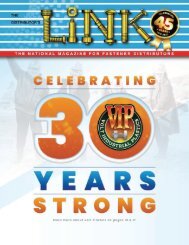SPRING 2012
Distributor's Link Magazine Spring Issue 2012 / VOL 35 / NO.2
Distributor's Link Magazine Spring Issue 2012 / VOL 35 / NO.2
Create successful ePaper yourself
Turn your PDF publications into a flip-book with our unique Google optimized e-Paper software.
THE DISTRIBUTOR’S LINK 101<br />
QUESTIONS & ANSWERS continued from page 100<br />
Which brings us to the second situation. You have<br />
some major difference of opinion in not only the degree<br />
of what is expected, but a deep-seated difference of<br />
opinion in the basic issues themselves. I’m not talking<br />
about issues like you think you need to focus on your<br />
current customers and your company wants<br />
you to sell new customers. Those are<br />
relatively superficial issues that fit<br />
into the previous discussion.<br />
Instead, I’m talking about<br />
differences in fundamental<br />
values and ethics. Here’s an<br />
example from my own<br />
experience. I once worked for<br />
a company that introduced a new<br />
product, and developed a quota for each of us<br />
to sell that product. The problem was, the product<br />
never worked. It didn’t do what the company said it was<br />
going to do. We, the sales people, knew it, and the<br />
company knew it. Yet, they still wanted us to sell it. We<br />
were given quotas and strongly directed to go out and get<br />
orders at all costs. They directed us to, in effect, lie to<br />
our customers. I left the company shortly thereafter.<br />
The issue wasn’t “Do I sell 100 or 130 of these”<br />
That’s an issue of degree. Instead, the issue was, “Do I<br />
lie to my customers” That’s an ethical issue.<br />
If it’s an ethical issue, then I think you have only one<br />
choice. Find another job. Life is too<br />
short to spend it violating your<br />
Sometimes<br />
sales people can<br />
get a little too<br />
convinced of their<br />
own importance.<br />
ethics and compromising your<br />
integrity.<br />
That sounds simple,<br />
and it rarely is that black and<br />
white. It almost never<br />
happens that your manager<br />
sends you an email that says,<br />
“From this day forward you will lie to<br />
your customers.” Instead, it is more<br />
likely that a pattern emerges over a period of time.<br />
One incident is generally not representative of a character<br />
flaw. But, when you see a pattern of cutting ethical<br />
corners, of disdain for integrity, of fuzzy moral<br />
boundaries, then you can conclude that those are<br />
expressions of a corporate character flaw.<br />
please turn to page 102

















